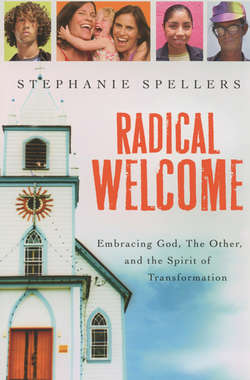Читать книгу Radical Welcome - Stephanie Spellers - Страница 12
На сайте Литреса книга снята с продажи.
The Radical Welcome Project
ОглавлениеMy survival in the church has depended on finding communities devoted to extending radical welcome. I first saw them in relative abundance on a study tour in the Episcopal Diocese of Los Angeles. But what if you couldn’t get to L.A. or some other oasis? Where were their stories, and how could others learn from their experiences?
I dusted off my reporter’s cap that summer and set out to examine eight churches moving toward fully embracing The Other in what I called “The Radical Welcome Project.” Those congregations were Grace Church in Lawrence, Massachusetts; St. Philip’s and St. Mary’s, both in Harlem, New York; St. Bartholomew’s in Atlanta, Georgia; St. Paul’s in Duluth, Minnesota; All Saints in Pasadena, California; Holy Faith in Inglewood, California; and Church of the Apostles in Seattle, Washington. I consciously chose to focus on the unique hopes and challenges of a selection of Episcopal churches, trusting that ultimately their struggles and insights would also prove useful across denominational contexts.
The sample covers small, medium and corporate-sized churches and draws from the coasts, the heartland and the South, as well as the suburbs, large cities and smaller communities. Most importantly, I wanted to study churches that ran the gamut in terms of community composition and who and how they were welcoming. In particular, I opted to focus on how each dealt with embracing across lines of race and ethnicity, generation, sexual orientation, and class privilege. Some wrestled with one issue, most with a combination. No one had the same margins or the same center, so the lessons are truly broad in their application.
In each congregation, I conducted in-depth research over the course of two weeks, including advance interviews and parish-written histories and other introductory materials, followed by at least ten days spent attending services, programs, meetings, and informal conversations, and concluding with follow-up contacts as necessary. My study of these congregations was less a precise social scientific study than an exploration and exercise in deep listening. Along the way, we talked about where they started, where they are now, and what steps they took along the way. We discussed how they welcome people from the margins, who The Other is for them, why they’ve taken up this Christian practice, what has proved most challenging on the road to radical welcome, and what barriers remain. They told me of their successes, their hopes and their failures, admitting that they were far from perfect, still met plenty of resistance, and sometimes fell off the path. And so, while these may not be the most radically welcoming churches anywhere, I came to value them for their sheer humanity and humility: they fall short and they keep trying, the momentum has waxed and waned, and that’s part of the wisdom they can pass along to the rest of us.
There are lots of radically welcoming Episcopal congregations nationwide and plenty more outside the Episcopal fold, and I’ve taken care to talk with representatives from a number of these communities. Over the past several years, I’ve interviewed more than 200 lay leaders, clergy, professors, seminarians, liturgists, change leaders at the local and national levels, and other observers: all of whom shared wise reflections on change, welcome, fear, church history, theology, Scripture, and more.
In the pages that follow, you will hear these voices in a lively conversation with the writings of the faithful, from the Hebrew Scriptures and New Testament through centuries of Christian theology leading to contemporary teachers throughout the Christian tradition and beyond our fold. Finally, I’ve incorporated insights drawn from my experience in faith-based community organizing and from consulting and sharing this material in communities considering or already committed to transformational growth. All this wisdom is compiled here and offered as bread for your journey.
